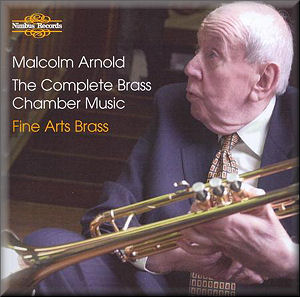 |
 |
| 
Buy
through MusicWeb
for £12 postage paid World-wide.
Musicweb
Purchase button
Sound Samples and Downloads
|
Malcolm ARNOLD (1921-2006)
The Complete Brass Chamber Music
Fanfare for Louis (1970) [2:07]
Brass Quintet No. 1, Op. 73 (1961) [12:23]
Fantasy for B flat Trumpet, Op. 100 (1969) [3:46]
Little Suite for Brass No. 1, Op. 80 (1963) [7:37]
Fantasy for Horn, Op. 88 (1966) [4:18]
Little Suite for Brass No. 2, Op. 93 (1967) [6:38]
Fantasy for Trombone, Op. 101 (1969) [3:13]
Little Suite for Brass No. 3, Op. 131 (1987) [2:25]
Fantasy for Tuba, Op. 102 (1969) [4:32]
Brass Quintet No. 2, Op. 132 (1987) [5:35]
Symphony for Brass, Op. 123 (1978) [23:44]
 Fine Arts Brass (Simon Lenton and Angela Whelan (trumpets); Tim
Thorpe (horn); Katy Pryce (trombone); Sam Elliott (tuba)); Fine
Arts Brass Quintet with Bryan Allen and Andy Culshaw (trumpets),
Simon Hogg, Kevin Pitt, Lyndon Meredith (trombones), Stephen Roberts
(conductor) (Symphony).
Fine Arts Brass (Simon Lenton and Angela Whelan (trumpets); Tim
Thorpe (horn); Katy Pryce (trombone); Sam Elliott (tuba)); Fine
Arts Brass Quintet with Bryan Allen and Andy Culshaw (trumpets),
Simon Hogg, Kevin Pitt, Lyndon Meredith (trombones), Stephen Roberts
(conductor) (Symphony).
rec. Wyastone Leys, Monmouth, UK, 2 April 2006 (Symphony), 6-7 June
2006 (Quintets and Fantasies). DDD
 NIMBUS NI 5804 [79:21]
NIMBUS NI 5804 [79:21] 
|
|
|
This recording turned out to be a memorial to the composer who
died on 23 September 2006, and what a fitting memorial it was.
In addition to being a gifted and under-appreciated composer,
Malcolm Arnold had been a first-class trumpeter, having played
in both the BBC Symphony and London Philharmonic orchestras.
He always displayed a real affinity for writing for the trumpet
and for the other brass instruments as well. Evidence of that
is clearly demonstrated here in performances of exciting virtuosity
and joy. Thomas Pridonoff gave the disc an enthusiastic review
back in 2007 and I can only echo his enthusiasm. If you are
looking for Arnold’s brass chamber music, this is the disc for
you. All of the performances here are first class in every way
and the recorded sound is at the same high level. The disc’s
program is well laid out, too, with various fantasies for individual
instruments interspersed between the larger ensemble works.
There isn’t a dud among them either, though I would suggest
dipping into a few at a time rather than listening straight
through the program. The CD ends with Arnold’s most ambitious
work for brass, the Symphony for Brass, which is also available
on a Decca collection of the composer’s music, as is the Brass
Quintet No. 1—the most popular of the works included here.
The Decca disc I cited above is a part of the British
Music Collection series of reissues and contains the wonderful
Guitar Concerto as well as the English Dances. However,
the sound is variable because of the different periods of the
individual recordings. The two brass pieces, performed by the
Philip Jones Brass Ensemble (PJBE), were recorded in the 1970s
(the Quintet in 1970 and the Symphony in 1979). Listening to
those recordings side-by-side with these on Nimbus shows the
advances made in digital recording. While the earlier Decca
recordings still sound quite spectacular, they are much more
upfront and do not provide as much ambience as the newer Nimbus
ones. They also reflect the differences in the performances,
with the PJBE a bit more exuberant, but less refined than the
Fine Arts Brass. Especially telling in the Nimbus recording
is the antiphonal dueling of the trumpets in the finale of the
Quintet. Whereas on the Decca disc, both trumpets seem to be
coming from one speaker, in the Nimbus they are clearly divided
between left and right and result in a real dialogue. I don't
want to make too much of the differences because both accounts
of the two works are terrific and one should be more than happy
with either one. If your primary interest is in Arnold's brass
music, then the choice has to be the Nimbus. If, however, you
want a good sampling of the genius of Malcolm Arnold, then the
Decca disc will do nicely. I wouldn't want to be without either
disc.
The Nimbus disc has good notes on the works and a center photo
of the Fine Arts Brass and colleagues at the recording of the
Symphony. There's also a fine photo of the composer with his
trumpet on the booklet cover. For all brass aficionados and
Malcolm Arnold fans.
Leslie Wright
see also review by Thomas
Pridonoff
|
|




 All Nimbus reviews
All Nimbus reviews








